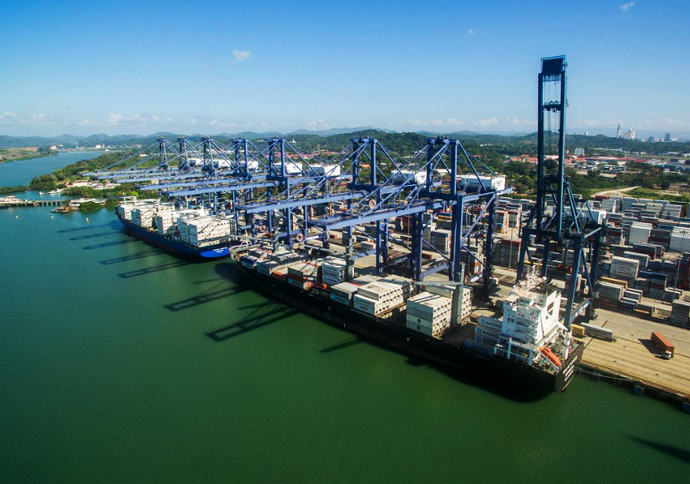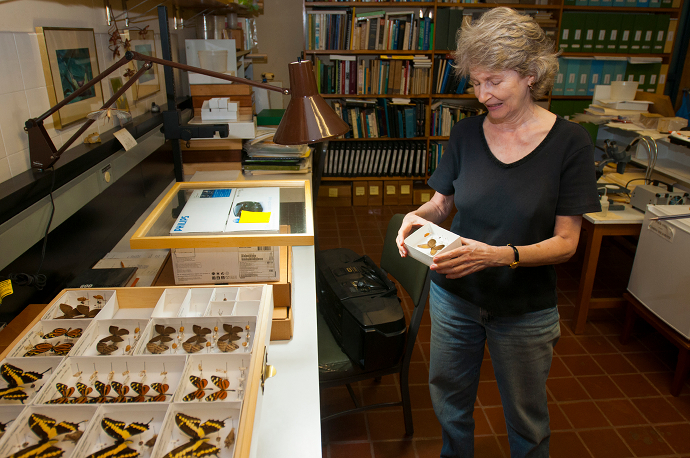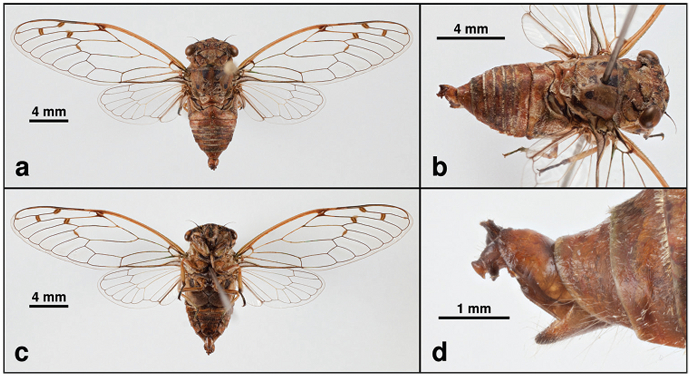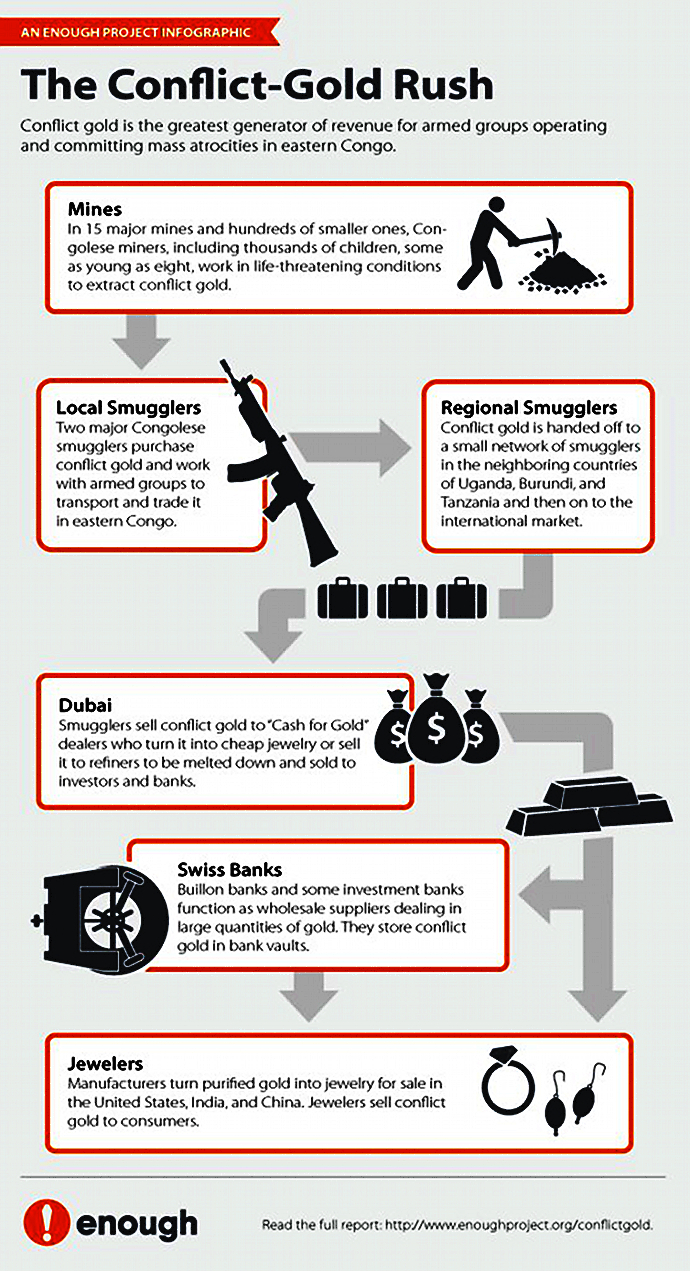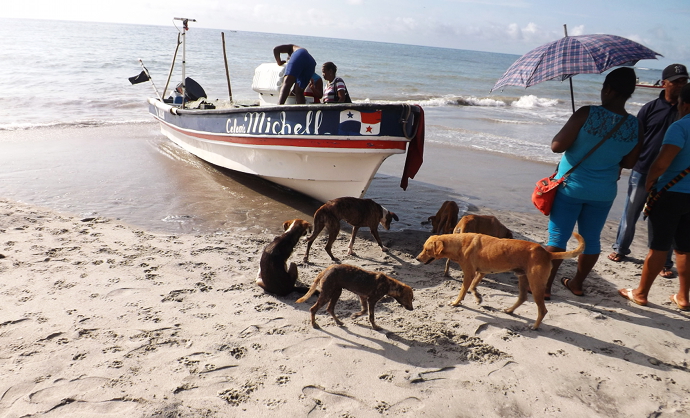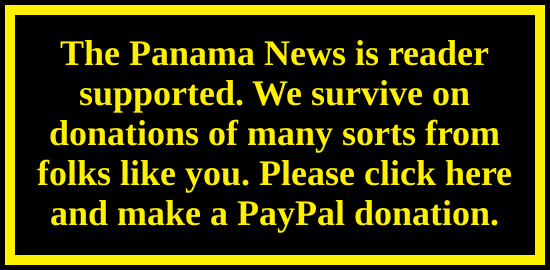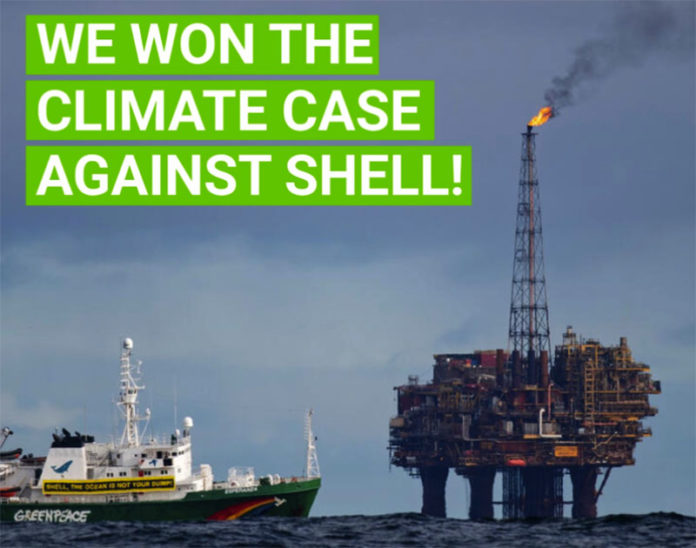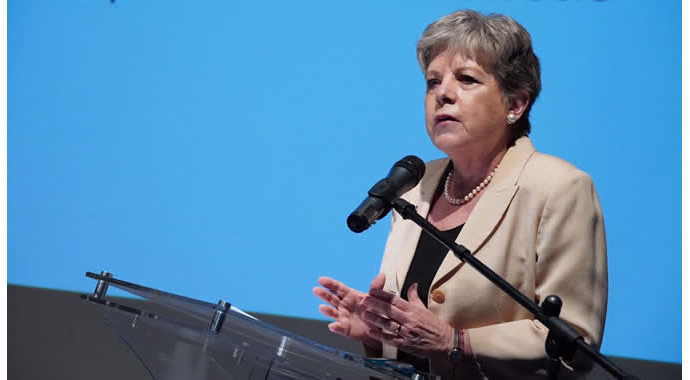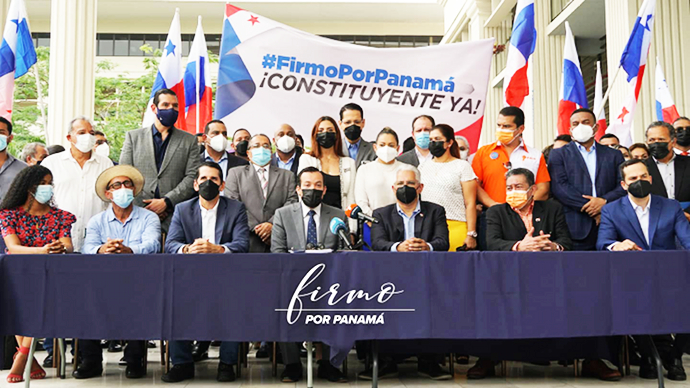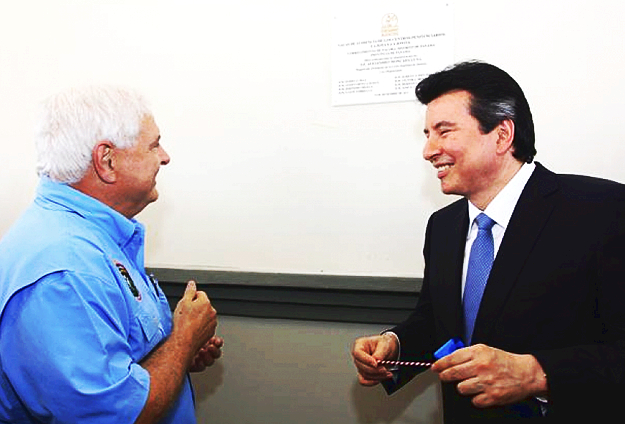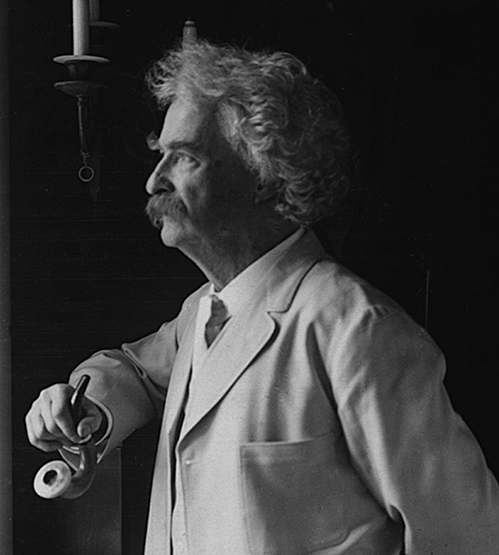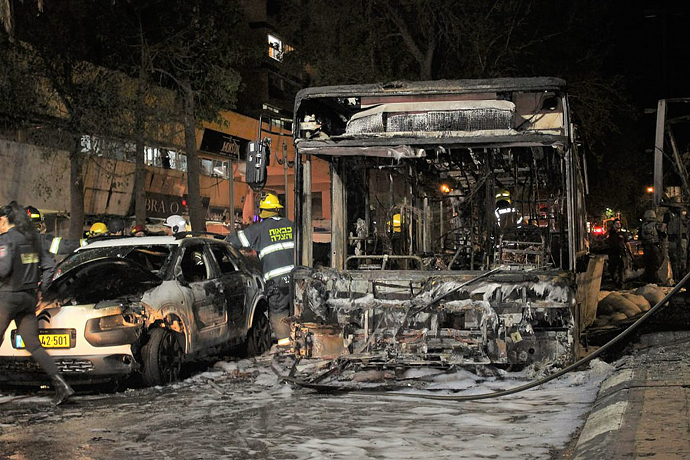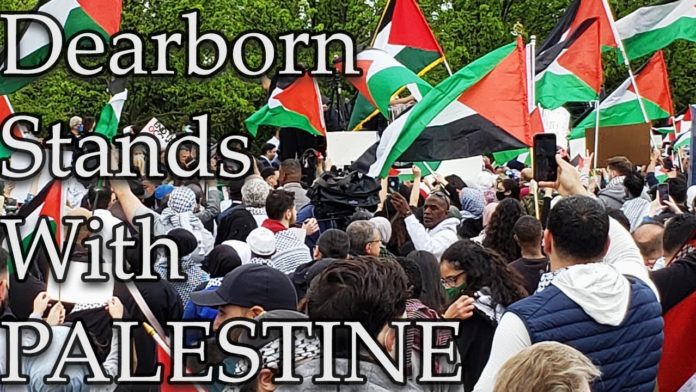It would be easy enough to dismiss this video as just Dearborn. But everyone in the crowd was not Palestinian, and all across the USA many Americans, including a lot of Jewish ones, fully agreed with the sentiments expressed here. There has been a qualitative change in US public opinion, especially among younger Americans, to stack upon the nearly unanimous international rejection of the ethnic cleansing of Palestinian lands and the bombing campaigns against Gaza.
The biggest threat to Israel Is the Occupation
interview by Michael Winship with Angela Godfrey-Goldstein — CommonDreams
I first met Angela Godfrey-Goldstein, the Israeli peace and anti-apartheid activist, on a sunny spring Sunday in Jerusalem almost exactly seventeen years ago, in 2004. It was at the end of the second Intifada, and a few of us clambered into a van so that she and a colleague could give us a tour of what it was like to be a Palestinian living in the Occupied Territories. It was revelatory. We’ve remained friends ever since.
Angela’s the director of Jahalin Solidarity, a non-profit dedicated to ending the forcible displacement of Palestinians and defending their rights, including self-determination and an end to the Israeli occupation of their land.
She’s my basic, go-to person on most matters involving Israel and the occupation, so naturally I got in touch when fighting broke out a week and a half ago between the Israeli military and Hamas forces in Gaza and other parts of Israel and the West Bank, the worst since 2014. Rockets by the hundreds have been launched into Israel, bombs have rained down on Gaza. According to USA Today, 12 Israelis including a 5-year-old boy, a 16-year-old girl and a soldier have been killed. Current Palestinian losses are at 230, including 64 children. More than 1600 have been wounded and 58,000 forced from their homes.
The events of recent days, the International Crisis Group’s Mairav Zonszein writes in the UK newspaper The Telegraph, suggest that Israeli policymakers “now seem unable to achieve even the lesser objective they espouse of long-term quiet not just in Gaza but also in occupied East Jerusalem, the West Bank and inside Israel proper…
What has unfolded… indicates that Israel’s strategy for achieving long-term quiet is not working — not only with Hamas in Gaza, but on the ‘Palestinian question’ overall.”
Angela and I communicated just as a fragile ceasefire was negotiated that began in the early hours of Friday morning. Our conversation has been edited for length and clarity.
What have your days been like while all of this has been going on?
The mornings are the worst. I wake up groggy. Within an hour I have to decide what to focus on, when all hell is generally letting loose — armed militias on the streets, especially in Palestinian parts of East Jerusalem, and Gaza being pulped. Two nights ago, I slept only an hour, woken by incessant warplanes flying in formation — they’re using F-15s and F-16s. Then you start thinking of them dropping payloads, gifts of death. One guy on a Zoom call of about 70 Israeli and Palestinian peace organizations the other day just lost eight members of his family but kept working — only mentioning it at the end of the call.
There’s analysis to read, focusing on what to share as advocacy resources. Twitter jumping. Stats of the dead. Friends asking how I am. There’s a horrible feeling among peace activists and other Israelis that it’s all falling apart. Dark, dangerous spirits and genies deliberately have been let out of the bottle (real neo-fascists) and no confirmation it can ever go back.
Police violence is more brutal everywhere, giving the distinct impression that this “round of fighting” (a euphemism for genocide?) was deliberately provoked, with [Israeli prime minister] Bibi Netanyahu seen by so many analysts and even members of his party, Likud, as having a vested interest in declaring war on Gaza and the Palestinians of East Jerusalem. Why were the police so harsh? So damned undisciplined? So racist?
Huge damage has been done to prospects for co-existence. Palestinian Israelis are 20% of the population, they’re our fellow citizens and our policies are radicalizing them, while 340,000 Palestinians in East Jerusalem live with almost no civil rights at all – including no one to vote for. The rest of the Occupied Palestinian Territories [OPT] also are without any statehood — 300,000, for example, live in Area C under Israeli military control in what for many, many years now we’ve been saying is an apartheid reality. Now Human Rights Watch and B’Tselem are saying it, too. So, in the early part of the day, it’s a question of trying to stay calm and not panic. Trying to find what’s essential, not get distracted or want to retreat into reading irrelevant stuff in the papers. Or spending time on Google Streetview somewhere in the Sussex countryside or searching for our old home in Mbabane, Swaziland, as an escape!
What’s the significance in this current conflict of Sheikh Jarrah, an East Jerusalem neighborhood settlers have long coveted?
Sheikh Jarrah is in the Holy Basin, just north of the Old City. The settlers with a messianic view see it as part of their birthright. Their intention is to take over the Old City and its surrounds. Watch the new short film Inside the Battle for Jerusalem by Vice News on YouTube or A Walk in the Park by the BBC in 2010. They make no secret of their intentions.
For me, this has nothing to do with Judaism — just as Christian Zionists renounce Jesus’ teachings and instead are gunning for The Rapture — the death cult that’s also riding on this poor horse. Judaism talks of respecting The Other. Of not doing to someone what you wouldn’t have done to you. Of modesty and humility. These people are, in my opinion, just fundamentally wrong. They do not seek peace. They do not want to abide by The Ten Commandments. They want power, they want land, they’re addicted to a Golden Calf. And of course, Donald Trump jumped on all the landmines. Remember Jared Kushner boasted of having solved the Middle East conflict, of having brought peace? Yeah, well, that didn’t work out so well, did it?
Let’s roll back a bit. Americans hear about Gaza and Hamas and then the West Bank and East Jerusalem. Many don’t fully know the geography and the issues and only think of Israel as “America’s friend in the Middle East.”
There’s a lot of commentary right now about the America – Israel relationship over the years. Rome and Sparta, the tail and the dog, and which is doing the wagging? The United States, with a certain level of naivete, has been an enabler since the Sixties. Two young nations established on lands of indigenous people whom they’ve deliberately displaced. Two nations’ pioneering spirit that’s been enabled to go out and conquer and take. Israelis justify it with history: “How can I steal what’s already mine? God gave us this land. We’re the chosen people.”
From my perspective, that mentality doesn’t understand the power of love, the need for empathy to protect your own humanity. Or social needs depending on The Stranger. And then – the Holocaust. “Never again to us” is taught. Not “never again to anyone.” And that trauma’s in the DNA of many – exploited by others. So when Israeli children go to Auschwitz on school trips the message is, “Look what happened when we didn’t have a strong army.”
The lesson’s not taught that we’re in a land with sacred meaning for all three theocracies, each different, yet praying to the same God. Each different, yet all based on similar foundations – love truth, praise God, be a decent human being, have a pure clean heart. Not a closed mean one, harboring murder and hatred and an inability to give. What would Netanyahu or [head of the Religious Zionist Party Bezalel] Smotrich say if a wise man made them choose between killing their dearest treasure or giving it away so it might live?
Is much of this crisis really about Netanyahu trying to divert attention from his alleged crimes and election problems? Is he relying on the notion that putting Israel back into war will solidify support for him?
This question’s on everyone’s lips. In private, even his own Likud party members are said to be deeply distressed – some, like former cabinet member Gideon Sa’ar, have left Likud to set up other right-wing parties. We’re reading testimony coming from court as Netanyahu’s cases (accusing him of bribery, corruption and breach of trust) are heard. The evidence is damning. So this “war” was likely deliberately cooked up as a distraction. And see — he foiled an alternative coalition agreement (having for the fourth time in two years failed to build a coalition himself) that was almost signed.
Also don’t forget the fissures in Israel as a fact of life, much incited and developed by him — he’s targeted the police, the judiciary, the opposition, the media. Fake news isn’t only alive and well in the USA. Netanyahu’s deliberately lying, playing the victim.
So people are even more divided — religious against secular. Settlers against those who want to end the occupation and make peace. Ashkenazi against Mizrahi Jews. Israelis against Palestinian 48’er fellow citizens. Russians are discriminated against. So are Ethiopians. Druze. Bedouin. Sometimes one wonders if the soup’s too thick!! But war has that way of bringing people together, back into the ghetto mentality, the bunker. So yes, it seems this conflict is being deliberately prolonged by those who want to stay in power.
In 1995, Prime Minister Yitzhak Rabin was assassinated for trying to make peace, so it’s become that much tougher since. He told the Israeli public, “We’re strong enough to come out of the ghetto.” But even with nuclear deterrence and one of the world’s largest armies, Israelis feel weak and vulnerable – and see themselves as the villa in the jungle without realizing that they’re helping to create a jungle. Anarchy. Impunity. Abandonment of human rights, or the international multilateral system. Justice. Normal life.
Bibi says we must live by the sword – but he’s never tried alternatives. There was never that “generous offer” so beloved of those who believe “Israel right or wrong!” Eldad Yaniv, former aide to ex-prime minister Ehud Barak, incessantly mea culpas on TV saying that was a slogan meant to win (they lost anyhow) an election after the 2000 talks with Palestinian Authority chair Yasser Arafat at Camp David failed. They never realized the public would believe it, but prefer to play the blame game.
That’s why I wrote in 2020 about who started the suicide bombings inside Israel that took the country over to the Right. Yes, Hamas is scary. But our policies of occupation and apartheid, of land-grab and displacement create conditions in which terror thrives. So no, we can’t feel confident deep down that people like us. Or that behind our backs they’re not scheming to stop us… I often say “You’ve got to be really mad to stay sane in all this sickness. Only psychopaths don’t feel emotional empathy with those suffering.” Is it fear in the DNA? Brainwashing and unwillingness to see The Other as human? Or maybe as even more human than you yourself?
So who’s to blame? Are allegations of Hamas provocation valid at all (they did fire many rockets toward Jerusalem and other Israeli sites) or were they themselves provoked? Recognizing that these are just the latest events in decades of discrimination against the Palestinian people, how are the violence and death of recent days different from those of the past? Is this the worst you’ve seen it since 2014 or the second Intifada?
I blame the conditions of our occupation, and the mistakes that were made early on by incoming refugees who desperately did what they thought they had to do – many of whom (check out Zochrot’s website) now regret the policies then adopted. Even [Israel’s first prime minister David] Ben Gurion, when asked years later if he’d made mistakes, acknowledged there were things he wished they hadn’t done.
The Geneva Conventions, a treaty Israel signed in its early years, prevents the acquisition of land by belligerent means. So the 1967 occupied lands should be restored to those who were there before. Not 2000 years ago – we’re talking about living refugees, many living inside the Occupied Palestinian Territories in miserable camps.
And part of this tragedy is that abused families abuse if the cycle of violence and trauma isn’t healed. Not least, it breeds entitlement and carte blanche: “We’re above the law due to our suffering.” I don’t underestimate the impact of that time – my late mother nursed Holocaust survivors from Bergen-Belsen as a student nurse in London. I remember my parents whispering about an evil too monstrous to be comprehensible. Or even talked about. Only whispers and photographs that – too late – were hidden from we children.
Even with the current new ceasefire, are we close to another war, to a third Intifada?
It’s a different scenario, I think, more a state of anarchy, riots and breakdown of the social fabric. Trust is dissipating. Age-old feelings are rising to the surface, neo-fascist urges floating like scum to the top. I think people are funding the sewage lunatics — I was told if I was working in a right-wing NGO, I could easily get a million dollars, no strings attached, not even reporting required. Could it be true? Well, Bibi’s in court about his courting of billionaires. The late Sheldon Adelson last year bought the US Embassy residence, and tried to buy your presidency, right?
There was talk — maybe as part of the ceasefire negotiations’ posturing (because game theory’s their game) — of whether we’ll re-occupy Gaza! Remember we left it when the water ran out underground. And when the Israeli public asked why soldiers were on their knees in military lines searching for their friends’ body parts. We hear of a possible northern front, too. But no talk of real peace.
Israel claims they’ve tried to minimize Palestinian deaths…
Even if it believes it’s pinpointing buildings, why are so many civilian families dying? So many children? And 180 warplanes flying over a strip of land the size of Philadelphia? Only 5% of Gazans have been vaccinated and they just killed the professor responsible for Gaza’s COVID fight. It’s one of the most densely populated places on the planet.
The Iron Dome anti-missile system, supplied by the USA, minimizes Israeli fatalities, and certainly there’s a power imbalance that has nothing to do with proportionality. Bombs every 10 seconds, we read. Trauma to last a lifetime, together with the fast-breeding of hatred, fear, revenge, anger and depression. I know people in Gaza — I can’t pick up the phone. What do I say? “Are you still alive?” That feeling in the pit of the stomach if the phone rings unanswered — as has happened in the past, in 2014.
Israel bombed a media center building in Gaza, housing Associated Press and Al Jazeera, among others. Your reaction?
Hamas isn’t only its military wing — it’s the government of that enclave, a political party… So maybe there was a ministry of women’s affairs there they bombed? Or any other office not part of the armed wing. What I do know is that they bombed a factory with Gaza’s only 3-D printer, which manufactured tourniquets and other medical devices or supplies. So when Netanyahu says there are only two options: continued bombing or re-occupying Gaza, it shows me that he and his ilk — for he’s not alone, decades of militarism have had their impact — never consider trying peace. He says we have no choice but to live by the sword. Is that why so many Israeli kids are living in Berlin? And doctors are leaving? COVID has shown Israelis how many Palestinian doctors keep the hospitals open and functioning.
What is the US not doing that it should be doing? How can we best pressure the Israeli government?
I firmly believe in the progressive wing of the Democrats. Bernie Sanders is the conscience of the party, and maybe the world (pace the Pope) on this. So’s Representative Betty McCollum of Minnesota with her bill to restrict the sale of US weapons so they’re not used in defiance of human rights, especially to harm children or civilians.
Put succinctly: STOP ARMING ISRAEL. When you see your best friend’s a junkie, stop giving them their drug supply! Get the US to recognize the international borders, so it has limits literally and metaphorically.
And end the impunity. Suspend the US veto at the UN Security Council! And recognize Palestine, so it can start its pathway to being a leader — with Israel — of a demilitarized, feminist and federal Middle East. That’s my radical imagination dream of where to focus the next 50 years.
The world’s waking up, even in quiet talks over Friday dinner: “Something’s gone horribly wrong with Israel.”
Is there no compromise to be had? Have the Israelis turned their back on a two-state solution or any solution that does not end with complete subjugation of the Palestinian people?
Bibi Netanyahu and the messianic or hardline rightwing have alienated the Israeli mainstream from choosing peace, even though some 50% still think the two-state solution’s the preferred way forward, and fear the coming tragedy of a bi-national, fully apartheid state. (Already 25% of Israeli Jews believe Israel is indeed an apartheid state, according to polls.)
I’m hoping that now that Palestinian 48’ers [Palestinian citizens of Israel] are uniting with their fellow Palestinians — in Gaza, East Jerusalem, the rest of the OPT and diaspora — the Israeli public will begin to understand that while they were living in a false reality of “quiet,” the racism, supremacy, apartheid and discrimination they were imposing on the Palestinians won’t deliver even quiet now. So, it’s time to rethink. (The Israeli militant right may say it’s not time to change the disc, it’s time to change the magazine — for more ammo.)
Is there any realistic end in sight that does not end in more and more death and bloodshed?
There has to be. We must get another government. Even [Israeli Defense Minister] Benny Gantz (for whom I don’t vote), after the last election said the biggest threat facing Israel is its occupation.
Our occupation corrodes our souls into apathy, encourages supremacist worldviews, and levels of fear and alienation that are scary. Children grow up to hate because they don’t know anyone Palestinian. Football crowds regularly chant “Death to Arabs” while those whose necks are under our boot say “Death to Jews.”
But if we can’t turn the corner and reset, I believe, tragically, this country has no future. Needed in the aftermath of the Holocaust as a haven, Israel has become far from safe or secure, and increasingly is breeding anti-Semitism. So worldwide, Jews are now less safe. Yet they aren’t putting pressure on Israel to end its 53-year occupation, to sit down and recognize the State of Palestine, to deal with the issues arising from the refugees: reparations, return, apologies.
Negotiate! Shoving stuff under the carpet only creates a stink that gradually undermines the very foundations. We must learn how to trust. And for that we must be trustworthy. We have to get back to the essence of Judaism — not the wild messianic versions of the greedy visionaries. And never forget — just before apartheid in South Africa fell, the activists were at their most depressed and hopeless. They didn’t know it was almost over.
In the last few days, a video has been seen on American TV in which a Palestinian woman says to a settler, “Why are stealing my home?” To which the man replies, “If I don’t steal it, someone else will.” I found that breath-taking on several levels. How about you?
Glad you saw that. That was in Sheikh Jarrah. Muna el Kurd is Palestinian and Yaakov Fauci is a Zionist settler from Brooklyn. You can see more of their interchange on a Vice News clip just launched: Inside the Battle for Jerusalem.
I was at Sheikh Jarrah in 2003, and wrote about it. That was my baptism by fire, I guess. The sheer banality of evil. It’s not a movie, with heightened music or dramatic weather effects. It happens in real life. Acts carried out even by people you may know or recognize from TV.
What’s your message to those in the US who keep sending military aid to Israel? What’s your response to those who condemn Palestinian violence but fail to do the same when the violence comes from Israel?
Wake up! You’re helping Israel to destroy itself. If you can’t see what’s happening, you’re willfully blind, prejudiced and have been drinking the Kool-Aid of the Israeli Ministry of Strategic Affairs and Public Diplomacy — the whitewashers. People here want to scapegoat and blame, while knowing they’re carrying out war crimes. But to take responsibility? To see our contribution? No.
What can American citizens do?
At the minimum, speak out. You are not alone. Most of the world accepts the Palestinian narrative by now. Support your enlightened members of Congress in their attempts at peacemaking, so they know they have your back against those whose funding often keeps them quiet. When you see The Onion inviting Israel by Twitter (58.6K likes/16.8K retweets) to bomb its offices all over the world, you can see it’s safe to speak out. John Oliver is, Jon Stewart did. On the right side of history. And conscience. And religious values. On the side of humanity. And freedom.
So, have the courage to voice your opinion. Vote for and support members of Congress who introduce bills to stop arming Israel. If you are part of civil society, organize around that demand, including BDS, and show your representatives in the government that you want sanctions, that you want them to stand up to Israel.
Watch, too, what’s happening elsewhere: in the United Kingdom’s House of Lords, a six-minute speech that’s revolutionary. On June 14, there’ll be a debate on sanctions in the UK, as a result of some 370,000 signatures (in six days) calling for them. Last night, Palestinian Ambassador Husam Zomlot was on Ch4 TV also convincingly setting out the way ahead.
And vote for progressives. Talk to your friends. Read. Come visit to see for yourself. And check what you’re being told, in case it’s spin or fake or “hasbara” – propaganda.
Through all of this, what keeps you and your activist allies going?
When you know people who are suffering, and you see gross injustice, it’s hard to walk away. I lived in South Africa, and saw the racism of the apartheid system there. The Whites always justified it, but deep down, felt superior, even when their leaders were corrupt and war mongering. Since humanity’s inter-dependent, if we aren’t socially responsible each to the other, we live demeaned, even dangerous lives.
Often, no one’s paying us for our activism or our high level advocacy. Neighbors disagree or disapprove (sometimes violently!). But we have a duty to speak out. Not least since we have a voice, whereas when Palestinians say what we’re privileged to be able to say, they’re silenced. And we love the better side of Israel – which still exists.
Our work is trying to change the paradigm. To correct mistakes made. Do we give up in the middle? If this is psychological warfare being waged against us, do we just tuck the tail in, and give up? Is that a response that offers any salvation? No. We need more strong, loving spirits – otherwise we could be in that post-Tahrir phase, when ten years ago the Arab Spring, the revolution, collapsed.
Michael Winship is the Schumann Senior Writing Fellow for Common Dreams. Previously, he was the Emmy Award-winning senior writer for Moyers & Company and BillMoyers.com, a past senior writing fellow at the policy and advocacy group Demos, and former president of the Writers Guild of America East. Follow him on Twitter: @MichaelWinship
Angela Godfrey-Goldstein directs Jahalin Solidarity, a Palestinian organization advocating against the Israeli Occupation. An environmental activist in Sinai, Egypt, for four years and a 2018 Rebuilding Alliance Peacemaker awardee, she wrote a chapter about her work for the past 20 years with Bedouin in a 2018 book, published by Veritas, “Defending Hope.”
Contact us by email at fund4thepanamanews@gmail.com
To fend off hackers, organized trolls and other online vandalism, our website comments feature is switched off. Instead, come to our Facebook page to join in the discussion.
These links are interactive — click on the boxes






